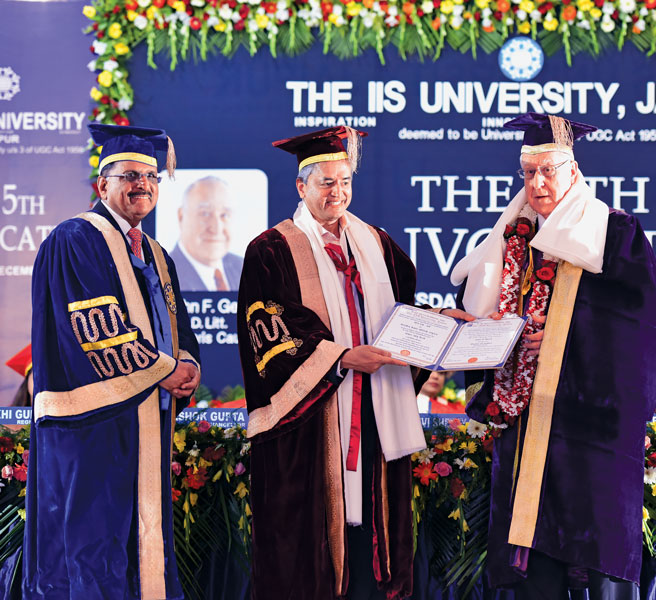Times are changing; colleges and universities play an integral role in honing students to be globally competitive. Employers recognise the role of colleges in preparing students for the real world. They agree that to succeed in today’s global economy, communication skills, critical thinking and analytical reasoning skills, application of knowledge and skills in real-world settings, complex problem-solving and analysis, ethical decision making and teamwork are absolutely important,” said Dr Devi Shetty, Chairman and Founder of the Narayana Hrudayalaya Hospitals.

Delivering the 5th convocation address at the IIS University in Jaipur, the eminent cardiac surgeon underlined the importance of innovation, and gave the graduating students the example of his having introduced health insurance for farmers in Karnataka with a monthly premium of only Rs 5. “So I can say with confidence that when we apply our minds with seriousness, solutions are not difficult to find. And in the Indian context it is important to remember that it is not a solution if it is not affordable.”
I accept this degree gladly and proudly on behalf of Rotary: on behalf of the men and women who, working together, have advanced the knowledge of generations, and will continue to do so for many generations.
— RI President John Germ
He said he was happy to note the IIS University had always empowered women and is primarily a women’s university. One woman who had influenced him greatly was Mother Teresa who he had first met in 1984 when she had a heart attack “and I looked after her for the first five years of her life. Mother strongly believed that love is the most powerful weapon, which can conquer the world and that teaching has impacted me tremendously… today the world requires love and tolerance.”
The real purpose of education is to empower students to find their own paths to their own dreams and create life-long learners, who are prepared both for the modern world and the future, and to empower students to make an impact in the world.
Also the effective and optimum use of technology for the betterment of our masses can never be understated. “As people embrace new innovations and technologies, higher educational institutions must also learn to keep up with this trend. The future of not only their students but also the economy will largely be determined by the abilities of colleges and universities in preparing students for a globally competitive workforce. Curriculum must keep up with changing times and remain relevant,” he added.
But along with all this, he advised the youngsters to “listen to your conscience, seek advice from someone you trust. The last measure of integrity is that no act of yours should cause you private shame, when put to public scrutiny. It is also the test of one’s character.”
On this occasion the IIS University conferred on RI President John Germ a doctorate — Doctor of Letters — which, Vice Chancellor of the University Ashok Gupta said was being given to him for “his substantial, sustained and exceptional contribution in the field of community service; he is a champion of human rights.”
Accepting the doctorate on behalf of Rotary, the RI President said, “Often these days, as I travel for Rotary and find myself in places that I never thought I would be, doing things I never thought I would do — like standing up here in a cap and gown, accepting an honorary degree. When I got my Bachelor of Science in Mechanical Engineering from the University of Tennessee at Knoxville in 1961, I thought it was a pretty safe bet that I was all done wearing this kind of thing. But that’s another way that Rotary is really a metaphor for life. Just like life, it has a way of surprising you.”
He told the students that like many of them, he was the first one in his family to go to college. “My own father never got more than an eighth-grade education, and spent his life working with his hands. Like your parents, he always wanted me to go on to have a better life. And just like your parents, he knew that the way for me to have that better life, was through education.”
Education was an important focus area of Rotary and in India, Rotary was working hard to give thousands of children a better life, through education; “by improving the infrastructure, that will allow more children, and especially girls, to continue their schooling in dignity and in health.”
Though the degree he was accepting did not reflect his own work or accomplishments, or “my own contributions to human knowledge, I accept it gladly and proudly on behalf of Rotary: on behalf of the men and women who, working together, have advanced the knowledge of generations, and will continue to do so for many generations to come.”
In his opening remarks Gupta said this convocation marked the second decade of the IIS University which was committed to delivering quality education to 5,000 students. He recalled how last year the faculty and students had played an active role in the Jaipur Zone Institute. Following this the Board of management of the University had decided to sponsor a Rotary Club of the IIS University.
Over 1,540 students were conferred degrees and diplomas under various programmes of the University at the convocation which was attended by TRF Trustee Chair Kalyan Banerjee and RI Director Manoj Desai.






